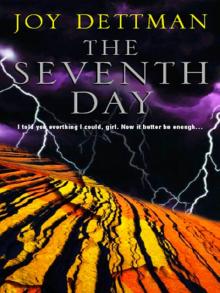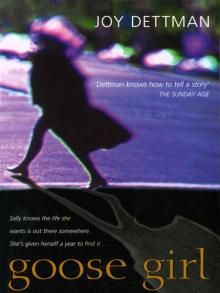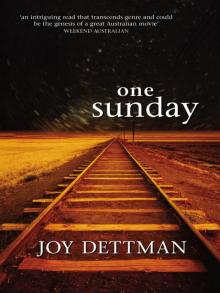- Home
- Joy Dettman
Ripples on a Pond Page 10
Ripples on a Pond Read online
Page 10
One thirty, according to her watch. She sat immobile, waiting for the knocker to give up, or for a voice that might identify him or her – not that she’d be opening her door no matter who was out there.
This time the knock was accompanied by a voice. ‘We know you’re in there, poppet.’
Robert? Oh shit! Oh Jesus! Oh Christ!
‘We heard you typing, pet.’
And Myrtle. Shit, shit, shit, shit!
This was cold-sweating disaster. She had seven weeks to go. She could see the end of it. She had an appointment with the doctor on Monday week and was looking forward to the Geelong supermarket and fresh fruit, to a piece of fillet steak. She was not opening that door, not to Robert, Myrtle, God or the devil. And they couldn’t prove she was in here anyway.
They could. She heard a key in the lock – and cursed herself for giving them that key, and cursed Myrtle who had never lost anything in her life.
The safety chain held, but Myrtle was pressing her face to the three-inch gap. Not a lot to that dogbox sitting room; and the majority of what there was visible through that gap. The television and its complex coat-hanger aerial, the heavy old desk, typewriter, and Cara, clad in her writing uniform – white stretch shorts in need of a wash, elastic riding comfortably below the bulge; breast-hugging, nipple-displaying singlet top, riding above the bulge.
Myrtle’s face disappeared from the gap to be replaced by Robert’s, slightly higher, though not much.
‘Remove this chain, Cara,’ he demanded.
No more poppet. Poppet was popping out of her shorts. Poppet’s navel had popped.
She removed her bulge from their vision, waddled to her bedroom to cover herself with her washed-out brunch coat.
‘Open this door, Cara.’
‘Stop pushing against it and I might be able to.’
They stopped pushing. She let them in, or not quite in. They stood side by side in the doorway, staring at the loose-fitting cotton gown, Myrtle’s eyes leaking, Robert’s expression suggesting he’d prefer to be out than in.
‘The bank finally foreclosed on you,’ Cara said.
‘Why didn’t you tell us?’ Myrtle wept.
‘Where is your husband?’ Robert asked.
‘What are you doing down here?’ Cara said.
‘How long have you been home?’
‘I asked what you were doing down here.’
‘Cathy called. She told us that Morrie was flying in.’ Myrtle had taken a step nearer. The handkerchief was out and mopping her round face. ‘We’ve never met him. Why on earth didn’t you tell Daddy and me that you were expecting?’
‘I thought it was indigestion,’ Cara said. ‘When is he flying in?’
‘This evening. Cathy didn’t tell me that you were in the family way.’
‘You’re doing a good job of telling the neighbours,’ Cara said, reaching behind Myrtle to close the door.
Robert limped towards the kitchenette. Myrtle reached out to her. Cara evaded her arms, requiring only answers right now.
‘When did Cathy call you?’
‘On Sunday. She rang to ask when you’d be home. She thought you’d gone to New Zealand, that you were visiting your uncle. I rang Richard.’
That was how Cara’s well-planned deception had disintegrated: big-mouthed Cathy and Uncle Richard, who Cara had never met – who wasn’t her uncle anyway, just a male loosely attached to Myrtle; very loosely attached since Robert’s previous bank loan had bought him out of his half-share of Amberley. Cara knew the story. Knew that three years ago, after learning Amberley had been divided into units, he’d tried to prove that pre-war sale invalid. After what had gone on back then, Myrtle had raised sufficient nerve to phone him?
‘Did you fly in together, pet?’ Myrtle asked.
‘What?’
‘Is Morrie here?’
Cara shook her head and looked at her watch. He’d be here this evening. She’d had a key cut for him too! Shit, shit, shit.
Myrtle, having walked into a situation beyond her comprehension, was doing her best to handle it. Robert, shocked silent, had his back to the bench separating kitchenette and sitting room, where he stood staring at the bulge beneath his daughter’s brunch coat.
Cara turned to him. ‘You drove down?’
He nodded.
Myrtle replied. ‘We stayed at Albury last night.’
Cara turned her bulge away from their view and went to her desk, where she started packing her typewriter into its carry-case. She rubber-banded a bulk of pages together before sliding them into a folder, then turned her television off at the wall and pulled out the plug.
They stood watching, Myrtle and Robert, glancing at each other while their daughter unhooked her wire-and-coat-hanger aerial from the curtain rod.
‘You shouldn’t be reaching up like that, pet. The cord can get–’
God help you, Jenny Morrison, Cara thought, and disappeared into her bedroom.
Myrtle followed on her heels; watched the folder tossed into a case, watched it buried beneath the jumbled contents of her daughter’s underwear drawer.
‘Your father has a room booked at a hotel tonight. He needs to sit down and put his foot up. His knee has been giving him trouble since we left Albury.’
‘Why don’t you learn to drive?’
Cara was at her wardrobe, looking for garments that still went around her. Tossed her stretch slacks into the case, a handful of T-shirts, Morrie’s white shirt. She was closing the case when Robert limped to the doorway. Today, he made no attempt to confiscate the case – as he had when she was fifteen and planning an escape to Sydney.
‘You might explain yourself,’ he said.
‘I’ll drive if your knee is bad,’ she said.
The case placed beside the front door, she reached for a shopping bag, which she proceeded to fill with a can of peaches, a large jar of coffee, three packets of dry biscuits, cheese, a carton of cigarettes, two bags of nuts. Would have forgotten about Morrie’s car had his keys not been on the bench beside her handbag. He was probably coming over here to ship that car home. She stood a moment looking at the keys, then went to her kitchen tidy for a cigarette packet she’d emptied last night. Found it beneath potato peelings, slid his keys into it, wrapped it in a brown paper bag and sealed it with sticky tape.
‘Have you been with him in England?’ Myrtle asked.
Pen in hand, Cara was trying to remember Cathy’s street number. They’d built a new house. Was it fourteen? Someone was number fourteen. Ballarat’s postman would know where Gerry lived. She addressed the small parcel to Doctor Gerard Jasper, then offered the shopping bag to Myrtle. She took it.
‘Are you capable of carrying the case down, Daddy?’
‘What your mother and I require is an explanation,’ he said.
‘We’re going home,’ she said.
She opened the front door, slid both handbag strap and the typewriter bag’s carrying strap over her shoulder, and picked up her television. It had a form of handle but was barely portable. She got it out to the landing, slid her case out, then stood waiting to close the door.
They followed her downstairs, followed her to their car, where Robert refused to hand over his keys. Cara got into the rear seat. She directed him to her post office, but, not dressed for the shopping centre, gave Myrtle the small parcel and told Robert to double-park while Myrtle slid out. A tram behind them, a stream of traffic behind the tram, Robert drove on to the next traffic lights, where he turned left – and almost collected a pedestrian. That’s when he gave up his keys. He didn’t know Melbourne and had already battled his way through it once today. He gave up the front seat for the rear and, ten minutes later, after two turns around the block, Myrtle slid in beside him.
It took the best part of an hour to fight their way clear of traffic to Sydney Road, but once on the open road, Cara gave the five-year-old Holden its head.
‘There are speed limits,’ Robert snapped.
‘Back-seat
driver,’ the speedster replied, but didn’t ease off the accelerator. If Morrie was flying into Melbourne this evening, she needed to be far away.
*
Night was coming down when they drove into Wangaratta, the car gasping for petrol. Robert had been warning her for the past half-hour to find a service station. She pulled into the first she sighted and an attendant filled the tank.
‘We need to find a motel before nightfall,’ Myrtle said.
‘You know where to find one in Albury,’ Cara said.
They used the service station toilets; Cara had a smoke. Robert wanted to slap it out of her hand, she could tell, but that would mean approaching her. He kept his distance.
‘Smoking is harmful to the unborn baby,’ Myrtle warned. She carried Robert’s pills in her handbag. She dug a water container and mug from the loading area of the wagon and fed him two before they hit the road again. They stopped his nagging. He was asleep before they reached Albury. Myrtle didn’t suggest they find a nice motel. The five-hundred-mile stretch between Sydney and Melbourne was possible in one hop. Cathy had done it in a Mini-Minor. At fifteen, Cara had done it in the rear seat of the old Morris. Robert’s wagon appeared happy to keep on going so Cara kept on going.
She could thank Uncle John and his sons for the Holden. They’d talked Robert out of buying another Morris. The EH wagon was superior to the EJ, they’d said. Holden had got rid of the old grey motor with the EH. Cara knew nothing about motors, grey or red. All she knew was the EH Holden was a gem to drive, and on good stretches of the highway its speedometer crept too easily to eighty – and would have gone faster. She kept pulling it back to seventy and knew that if Robert woke up and saw she was doing seventy he’d have a convulsion. Fifty miles an hour was his limit.
He didn’t wake, not until she stopped at the dog on the tucker box, needing a toilet again. Nerves maybe, or no space left for a full bladder. Robert demanded his keys. May have fought her for them had she not taken them with her into the ladies’. His voice pursued her.
‘You’re driving like a mad woman.’
Myrtle, dishevelled and yawning, followed her in. ‘Give him his keys, pet.’
‘We’re almost there,’ Cara said.
‘We’ve got miles to go!’ Myrtle wailed.
‘Give him another pill and shut him up, Mum – and you take one too.’
Drove on with the truckies, counted nine in convoy on one stretch of highway. No truck passed her. A few slowed her pace. On one bad stretch, she followed two trucks for fifty miles before she could pass them. Silence from the back seat, a movement from time to time, a sigh. Hoped she could find her way through to Amberley without their help. How many times had Robert followed the same route out of Sydney?
Didn’t know what she was going to do when she got there. She’d had it all worked out; had almost done it. Now her plan had been shot to hell.
And why was Morrie coming back? She’d told him to stay on his side of the ocean until the marriage was undone. Probably for his car. Cathy should receive the keys in a day or two – and he’d have spare keys anyway.
Landmarks alter, and it’s not easy to read street names at night when eyes feel as if someone has taken to them with emery paper, but Cara got them home. Not quite four when she parked the wagon in Robert’s bay. He was awake, and when he roused Myrtle, she couldn’t believe they were there.
Cara carried her television into Amberley’s parlour, carried her case into her room then closed the door. Didn’t want the morning, or what she’d be forced to face come morning, but the bulge was sleeping. She didn’t disturb it. Slid into bed in her shorts and singlet top where she slept until noon.
NIGHTMARES
‘You’re dreaming, Jim. Wake up,’ Jenny said. ‘You’re in bed.’ She had a grip on the tail of his pyjama top, a dangerous pastime when he dreamed of war. There was a lot of length, a lot of strength, in Jim Hooper. She’d carried a bruise or two from his close combat with the enemies of his nights. He’d worn his own bruises before they’d moved their double bed in hard against the wall. By day he wore a partial artificial leg, but in dream he had two legs, and when he took off in pursuit of the Japs, or dodged their bullets, he went sprawling.
His bad dreams were rare these days and he woke more easily from them. ‘Sorry,’ he gasped, pulling her to him. ‘Sorry, Jen.’
‘What were you dreaming?’
‘It’s gone,’ he said.
Maybe it was. Maybe it wasn’t. By day or night he never spoke about his war.
‘If you could talk about it, you’d stop having those dreams,’ she said.
‘It’s the futility,’ he said. ‘The same helplessness. When does it end?’ He lay back on the pillow then, his arm beneath her shoulder.
The futility. She knew what he meant. Raelene was back in town, or out at the commune. She disappeared for months on end and they thought they’d seen the last of her, but she came back. Always came back.
They’d spent five futile years attempting to sort that girl out. For two of those years they’d driven her down to city psychologists, social workers, hoping one of them might be able to fix up her head. She was eighteen now, considered by society to be an adult and capable of taking charge of her own life.
She was in charge of their lives, of Trudy’s too, she and her tattooed bikie.
Jenny had seen them go by two days ago, Raelene clinging onto the back of his oversized motorbike. Then last night, about to lock the house up and walk down to Amy and John’s for dinner, and that bike came back. For the next two hours it had roared around and around the block. They’d aborted their dinner date, aware that if Raelene decided to get into their locked house, she’d get in – and get out with something saleable.
They’d phoned the constable at nine. He’d chased the bike out to Monk’s gates, but when he’d come back, they’d come back. Just a game to them. Not to Jenny.
‘Sell up and move, Jim. We could buy in one of the outer suburbs.’
She’d move to Melbourne tomorrow. A month after she’d moved into Vern Hooper’s house she would have moved. They’d got rid of the old wallpaper, had spent a lot on paint and drapes and carpets. They’d gutted the kitchen and refitted it from the floor up. They’d dug up the back lawn and turned it into a vegie patch, but it was still Vern Hooper’s house, and to Jenny it would never be anything else.
‘We can’t live like this. It’s not good for Trudy to live like this.’
Jim kissed her face, but didn’t reply. Moving was something else he refused to discuss. He’d found his old space waiting for him in Woody Creek, had found the Jim Hooper he’d been before the interruption of the war.
‘They like cities. They’ll move on soon.’
‘And come back too,’ Jenny said.
Florence and Clarrie Keating, Raelene’s mother and stepfather, had sold up again and moved to God alone knew where. As a twelve year old, Raelene had been stealing from them and their neighbours. When she’d been released from the girls’ home, she’d attempted to carry off one of her half-brothers, and if he hadn’t possessed the sense to kick and scream, who knows what could have happened to him.
And who knew what she’d do to Trudy if given half a chance. Jenny didn’t give her that half-chance. She or Jim drove Trudy to the school gate when Raelene was in town, and picked her up from the school gate – and that was no way for an eleven-year-old kid to live – or it wasn’t the way Jenny had lived at eleven.
‘If we bought a place in Melbourne, Trudy could go to that school as a day pupil.’
‘Go to sleep, Jen.’
I was asleep, she thought.
Years ago they’d put Trudy’s name down at the Methodist Ladies College. Jim’s sisters had been educated there, which was no recommendation, but Paul Jenner, one of the wealthy farmers out Three Pine’s Road, had sent his youngest daughter there. She was currently studying law at a university.
Trudy would start high school next year and, one way or another, Jen
ny would have to come to terms with sending her away to school – just thinking about it worried her. Jim and she had mollycoddled Trudy. She’d grown into a sweet-natured, gentle kid, and was too shy with strangers. She wouldn’t handle being away from home.
Jenny eased herself up on her elbow to see the hands of the bedroom clock.
‘What’s the time?’ Jim asked.
‘Almost three.’
He rolled to his side to face the wall; she fitted her body against his, her arm over him, a slim protection against bad dreams. No protection for her. Her back was to the open door, and what was to stop Raelene from creeping in?
There were too many windows in this house and glass doors that led out to the eastside veranda. And the house made noises. Last week, she and Georgie had taken a chainsaw to a limb of the oak tree that had spent half of its life scraping against the veranda spouting.
Georgie, her rock of Gibraltar in a stormy sea, her mate, confessor and relaxation medication. She yawned, rolled over to face the door, bunched up the pillow to support her neck then put herself to sleep by imagining that Jim had agreed to sell and they’d bought a modern little house in Ringwood, close to Nobby and Rosemary’s – a not-too-little house. There was a room in it for Georgie.
*
Saturday was Trudy’s netball day. She’d never been into sport and didn’t move around the court as well as some of the girls, but having spent too much time shooting goals alone in the backyard, she was a champion goalie, and tall enough for the job. Jim drove her to the courts, then stayed to watch the game.
Saturday was Jenny’s baking day. She slid two trays of Granny’s oatmeal biscuits into the oven then reached for plain flour and her large earthenware bowl. She’d promised to make Cornish pasties for lunch. Making flaky pastry was time consuming, but the game wouldn’t end before one. She had an hour.
She was rolling the pastry for the third time when the wire door behind her opened and Raelene walked in.
Swung around to face the visitor who had crept up on her.

 The Hope Flower
The Hope Flower Trails in the Dust
Trails in the Dust Diamonds in the Mud and Other Stories
Diamonds in the Mud and Other Stories Moth to the Flame
Moth to the Flame The Tying of Threads
The Tying of Threads Wind in the Wires
Wind in the Wires The Seventh Day
The Seventh Day Thorn on the Rose
Thorn on the Rose Jacaranda Blue
Jacaranda Blue Mallawindy
Mallawindy Ripples on a Pond
Ripples on a Pond Goose Girl
Goose Girl The Silent Inheritance
The Silent Inheritance Henry’s Daughter
Henry’s Daughter Yesterday's Dust
Yesterday's Dust Pearl in a Cage
Pearl in a Cage One Sunday
One Sunday